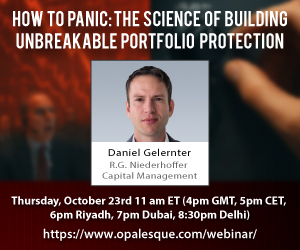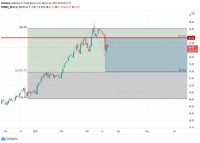|
Portfolio Interview: Dieter Kuffer, Senior Portfolio Manager, SAM Gatehouse Islamic Water Strategy "In early May of this year SAM and Gatehouse Bank jointly introduced their Shariah Compliant Water Strategy. On one hand a natural extension of SAM's already broad product range (product themes ranging from smart energy, climate to healthy living), and on the other a novel joint venture that capitalizes on Gatehouse Bank's know-how in the various aspects of Shariah compliance. Here we explore how their combined expertise in the fields of Sustainability and Islamic finance have been sown together." Q1. What was the key driver behind the development of the Water fund and launching it at this point in time? Where do you see it fitting within a portfolio (whether a conventional or Shariah compliant portfolio)? The long-term drivers in the water sector are intact. Water pollution, Water shortages, ageing infrastructure and climate change impact the water sector and will be a challenge for our generation as well as for the coming generations and offers attractive investment opportunities. Valuations of companies in the value chain of water are attractive compared to historic valuations. These days we launched an Islamic water strategy together with Gatehouse Bank which considers Shariah compliant investment criteria to benefit of the mentioned trends. The general SAM water strategy was launched already in 2001 and showed a strong performance. Q3. Screening methodologies have been in the spotlight recently - how integrated is the screening process to the asset management process? How often is this reviewed and/or calibrated? As Islamic investment criteria are binary they are used to define the investment universe. Gatehouse Bank will bring its know-how and expertise in the Shariah screening of the companies by its Shariah Advisory Board in the product, while SAM will attend to the asset management aspects of the strategy. The screening for Shariah compliance is done quarterly. Q4. The scope of potential investments spans across the entire value chain of the water industry, have you found specific areas that are less adept to passing the Shariah screens (i.e. sectors with high gearing, etc)? How does this differ from your conventional water strategies? Generally about 60% of SAM’s water universe passes the Shariah compliance check. The major issue for excluding is the leverage which may not be higher than 33% of the net worth of the company. Utilities often fail due to their levered balance sheet. So, it can be expected that the utility exposure will be smaller in the Islamic water strategy. Q5. On average, how many holdings do you maintain and what is the level of turnover for the fund? Do you have any limits in place in terms of holding size or a maximum percentage of shares? The number of holdings of the Shariah compliant water strategy is expected to be 45 companies approximately while the general water strategy of SAM holds 70 companies approximately. The maximum holding in a company is 10% of the strategy. The level of turnover will be around 100% p.a. Q6. Considering the number of holdings in the fund, would you label it as high-conviction? What are the pros/cons of running sector-specific strategies and how do you mitigate any potential issues of concentration, liquidity or idiosyncratic risk? As we have a bottom up investment process the holdings in the strategy are considered as conviction buys. Sector-specific strategies benefits of secular long-term trends and we expect that sector strategies outperformed the general equity market. As an example SAM’s water strategy launched September 2001 performed 80.1% in USD since inception while the MSCI World Index increased 30.3% only in the same period. Q6. What are the key geographies that you monitor? Do you expect government or supranational support to be as vital in these regions (as it has been to the alternative energy sector in Europe)? Are there any regions/currencies where you limit your exposure to? Do you use any hedging? It is a global strategy and we monitor water investments worldwide. When it comes to government support you need to consider, that globally 90 % of water utilities are government owned while 10% are privatized. However, also the majority of the privatized water utilities are regulated by public authorities. There are many different pricing model implemented and in some areas water prices and the infrastructure are subsidized by the government. On the other side the supplier of technology and services to the value chain are not regulated and benefits from above average growth rates. We will not use derivatives in the Islamic water strategy. The long-term currency allocation tends towards a global diversification in countries and currencies. Q8. How often do you review the overall portfolio? Are there any sectors which you are delaying any allocation or that seem overheated? Have you found Shariah screen useful to identify these? We don’t see overheated sectors in the water investment area. Generally the risk return characteristics of the Islamic water strategy is similar to the general water strategy. It is expected that the Islamic water strategy will have a lower exposure to utilities. When utilities underperform than the Islamic water strategy is expected to outperform SAM’s general water strategy. Q9. What is the target size for the fund and when would the fund reach capacity? How would this be mitigated, in particular with regards to smaller holdings in the portfolio? We have not calculated a specific capacity for the Islamic water strategy as the universe overlap with the general water strategy. For the combined water strategies we calculated a total capacity of USD 7 billions based on market cap and trading volume. |
Opalesque Islamic Finance Intelligence
Manager Interview: Dieter Küffer, Senior Portfolio Manager, SAM |
|





 RSS
RSS










